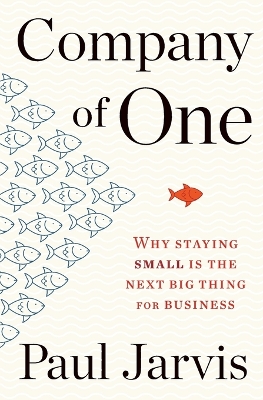
What if the real key to a richer and more fulfilling career was not to create and scale a new start-up, but rather, to be able to work for yourself, determine your own hours, and become a (highly profitable) and sustainable company of one? Suppose the better - and smarter - solution is simply to remain small? This book explains how to do just that. Company of One is a refreshingly new approach centered on staying small and avoiding growth, for any size business. Not as a freelancer who only gets paid on a per piece basis, and not as an entrepreneurial start-up that wants to scale as soon as possible, but as a small business that is deliberately committed to staying that way. By staying small, one can have freedom to pursue more meaningful pleasures in life, and avoid the headaches that result from dealing with employees, long meetings, or worrying about expansion. Company of One introduces this unique business strategy and explains how to make it work for you, including how to generate cash flow on an ongoing basis. Paul Jarvis left the corporate world when he realised that working in a high-pressure, high profile world was not his idea of success. Instead, he now works for himself out of his home on a small, lush island off of Vancouver, and lives a much more rewarding and productive life. He no longer has to contend with an environment that constantly demands more productivity, more output, and more growth. In Company of One, Jarvis explains how you can find the right pathway to do the same, including planning how to set up your shop, determining your desired revenues, dealing with unexpected crises, keeping your key clients happy, and of course, doing all of this on your own. AUTHOR: As a corporate tech designer and internet consultant, Paul Jarvis spent years working with professional athletes like Warren Sapp, Steve Nash and Shaquille O'Neal with their online presence, and with large companies like Yahoo, Microsoft, Mercedes-Benz and Warner Music. He then migrated to working with online entrepreneurs like Marie Forleo, Danielle LaPorte, and Kris Carr to help build their brands. Since becoming a company of one, he spends his time writing, podcasting, and creating online courses for more than 10,000 students. He lives with his wife on an island off the coast of Vancouver.
Growth, business, technology. Three things I’m very interested in, and perhaps very in tune with because it's what I do. More specifically though, the interest in how a company can be anti-growth and still prosper.
But, beyond the dictates of business, there is something that those of us are aware of - something Jarvis calls “conventional rules.” Some of these rules include the idea that as long as a business exists, it has to grow. I’ve always know there was another way.
This is the “fetishization of wanting more” that Jarvis rails against.
The eagerness at which Jarvis dismisses the freelance way of life (over making products) is almost immediately off-putting. The solid idea of a company built small and agile seems at least possible as a freelancer but Jarvis makes a point that they’re selling time.
I’m very sympathetic to this message as I’m the prototypical “company of one.”
“If you want a piece of content for your business to generate a billion views, you probably don’t understand the purpose of that content or whom it was really created for.”
Lots of unpopular messaging there. It makes sense though. Communications ought to be effective and that probably does run counter to internet popularity.
Throughout, a number of stories are relayed about how companies make the "One" idea work. Jarvis also includes a number of quotes like this one, pushing the idea that everyone need to be savvy to the the new tech.
“Every company is now a technology company” - a quote from Anil Dash.
Much of this feels dated, and the book is unfortunately bloated with repetitive titular mentions and concepts. I felt Jarvis could have pared this down by 50-100 pages and come out with more compelling prose.
Reading updates
-
Started reading
-
1 January, 2020:
Finished reading
-
1 January, 2020:
Reviewed
